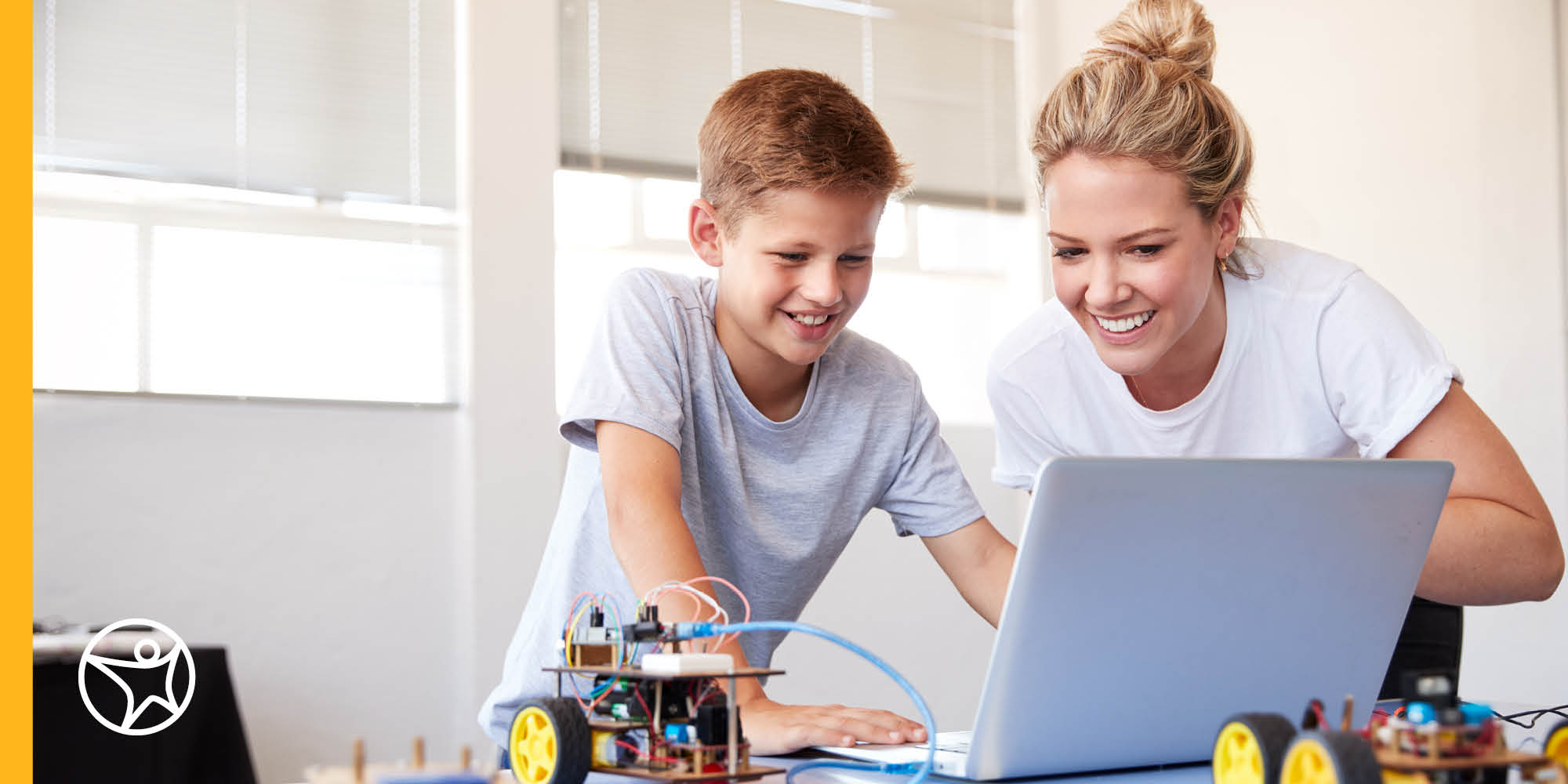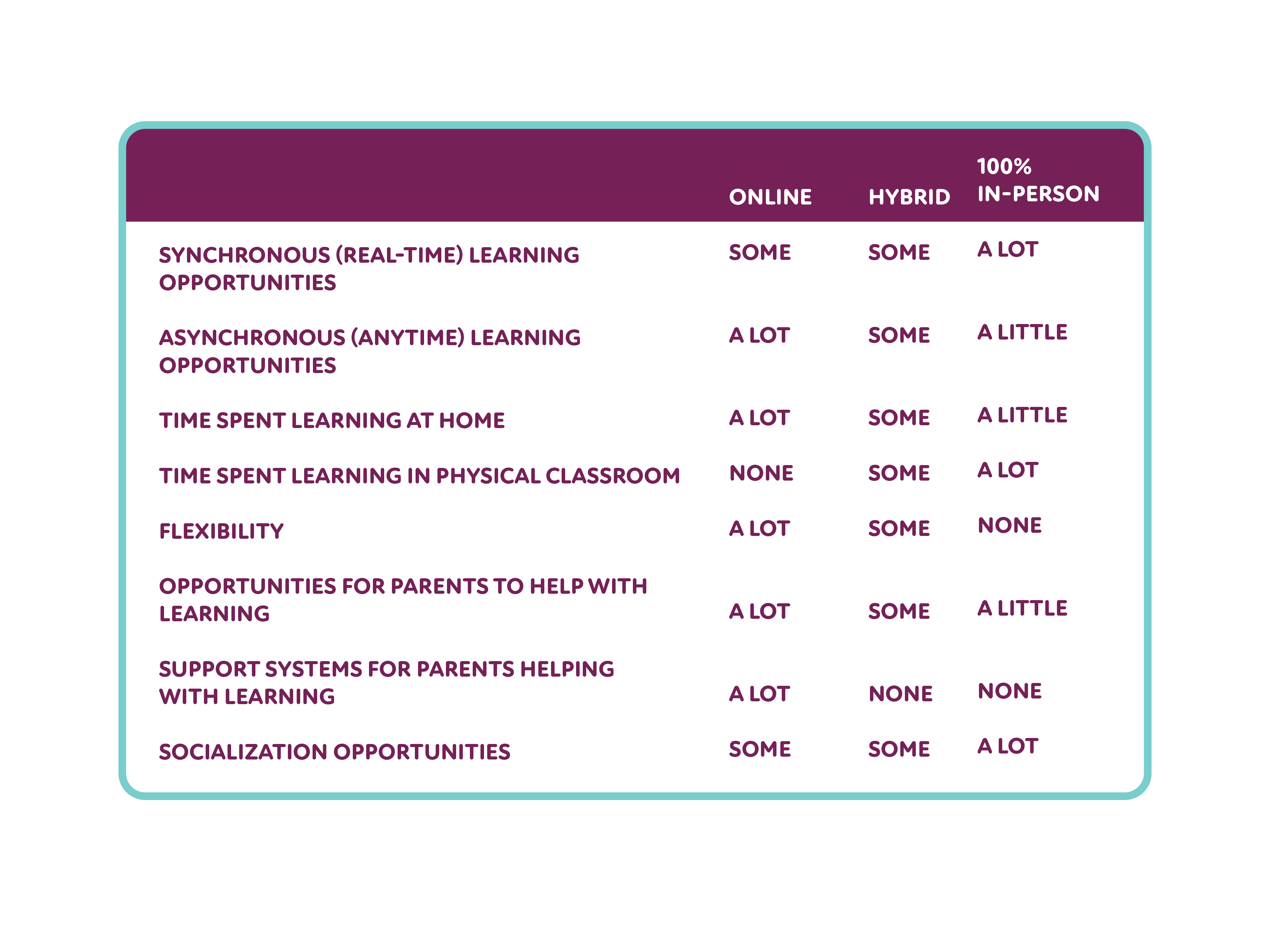Comparison: Online School vs. Hybrid Learning
byConnections Academy

While the COVID-19 pandemic brought hybrid learning into the mainstream and introduced millions of students and parents to the concept, it has actually been around for several decades. Today, over a quarter of all students say they’ve enjoyed the experience so much that they would prefer to continue to learn in a hybrid or online setting than return to brick-and-mortar school full-time.
There’s only one problem: fewer and fewer public schools are offering a hybrid learning option.
The solution for students who enjoyed hybrid learning could be enrolling in an online school. A good online school isn’t school from home as many experienced it during the pandemic. Instead, it’s a robust and effective learning experience designed by educational experts.
If you and your child have enjoyed hybrid learning and would prefer not to return to a traditional, 100% in-person setting, an online school could be a great choice. Here’s what you need to know to make your decision:
What Is Hybrid Learning and What Is an Online School?
Before you can decide the best learning format for your child, it’s important to have a clear sense of the terminology that educators use when referring to hybrid learning and online school.
Hybrid Learning
Hybrid learning, also known as blended learning, combines in-person classroom time with online classroom time. The in-person classroom time functions in the same way as traditional school, with set class times and a teacher in the room leading the day’s lesson.
As for the time spent learning online, the experience depends on the hybrid learning style the school employs. In the case of most traditional schools that went virtual during the pandemic, online classroom time functioned exactly like in-person classroom time, except that the teacher and all of the students attended the class over the Internet.
However, some schools have adopted a hybrid learning style that embraces an asynchronous, rather than synchronous, format. Synchronous learning is any learning that is happening in real-time. Asynchronous learning can happen at any time during the day.
In hybrid schools that utilize asynchronous learning, students are not expected to sit in front of their computers, listening to a lecture or completing work during the class period. Instead, they are given an assignment they can complete on their own at whatever time of day works best for them.
In a hybrid learning environment, online asynchronous learning gives students more flexibility and a greater ability to pace themselves. Experts consider this one of the top benefits of hybrid/blended learning. After all, students who can better pace themselves may be less likely to fall behind and more likely to master new information.
Online School
Online school, sometimes called virtual school, is a school where learning occurs entirely online. While many schools went virtual throughout different periods of the pandemic, a true—and good—online school isn’t a traditional school streamed over the Internet.
As previously mentioned, good online schools are designed by education experts to be online from the beginning. As such, their curriculum, format, and support systems are carefully constructed to ensure students have the opportunities they need to learn and thrive. A great example of this is Connections Academy®, a tuition-free, online public school with more than 20 years of experience as a K–12 online school.
One of the keys to Connections Academy’s effectiveness is its blend of synchronous (real-time) and asynchronous (anytime) learning. While students experience real-time learning through LiveLesson® sessions, they also spend plenty of time learning on their own schedule through lessons specifically designed to be online, backed by certified teachers trained in online education.
Additionally, Connections Academy provides plenty of support to both students and parents and offers lots of opportunities for socializing. These advantages, along with the flexibility provided by the learning format, give Connections Academy students a number of benefits that are similar—and in some cases superior to—hybrid learning.

How Hybrid Learning Compares to Online School
The main difference between hybrid learning and online school is clear: Hybrid learning is a blended learning style that includes time online and in a classroom. Online school conducts all learning online. But the two styles of learning share some commonalities, as well as some differences, in multiple areas.
Learning Style
Since hybrid learning utilizes in-person classrooms and online environments, the learning style is inherently different from what you’ll find at an online school. Primarily, hybrid learning asks students to be able to effectively learn in both modes.
While online schools also blend real-time and anytime learning, they allow students to complete all of their schooling from home or from anywhere else they want or need to be. Additionally, online schools tend to provide more asynchronous/anytime learning lessons, helping students build life skills like responsibility and adaptability.
Flexibility
Both hybrid learning and online schools offer flexibility. The difference is in the amount of flexibility provided.
Because hybrid learning has a significant in-person component, students in a hybrid learning environment have less control over their daily or weekly schedule. Online school students, on the other hand, often have the ability to plan their day—and even their week—in the way that works for their personal needs and fits how they learn best.
Additionally, online schools like Connections Academy offer flexibility in curriculum. In fact, Connections Academy puts together individualized learning plans for every student, focusing on the student’s strengths, challenges, and goals for school and their future.
Socialization
In a hybrid learning environment, students spend time in physical classrooms with their peers. They can also participate in afterschool programs, ensuring they have plenty of opportunities to socialize and develop their social skills.
At an online school, there are no physical classrooms, but there are still opportunities to socialize. Connections Academy, for example, brings students together to work on class projects online. Plus, the school offers a wide range of online student clubs. Through these clubs, students can meet others who share their interests and spend time hanging out online with peers from around their state and, in some instances, around the nation. Most find this to be a great way to meet new people and make new friends.
Connections Academy also offers in-person field trips where students can meet peers from their area and spend time exploring the world together. Such opportunities ensure students enrolled in an online school like Connections Academy can develop important social skills like teamwork and empathy.

Parental Involvement
Many parents of hybrid learners have enjoyed the opportunity to spend more time with their child and be more involved in their learning. While hybrid learning definitely allows for more parental involvement than traditional, 100% in-person school, online schools allow for even more.
In an online school, parents become their child’s Learning Coach, taking an active role in daily and/or weekly learning assignments. For many families, this is a great arrangement and helps students succeed. After all, who knows a child’s needs and personality better than their parents?
Student and Parent Support
Being more involved in your child’s learning can be a great experience—but it’s even better if you’re well-supported by your child’s school.
Since many hybrid learning opportunities are offered by school districts that were originally designed for 100% in-person learning, the level of support they offer varies. In many cases, students and parents have to rely on individual teachers to reach out and provide guidance, as the school has no established support system for remote learning.
This is not the case at a good online school. For example, Connections Academy provides a robust system of support for both parents and students. Parents at Connections Academy can turn to all kinds of resources designed to ensure they are effective Learning Coaches. And the school’s teachers, staff, and counselors are trained in identifying any struggles online students may be having and working with them directly to overcome obstacles.
Hybrid learning environments and online schools share a lot of benefits. As hybrid learning opportunities wane, an online school can be an excellent alternative for students and parents who prefer the flexibility, parental involvement, and other advantages that traditional, in-person schools don’t offer.
To learn more about what it’s like to send your child to an online school, check out our article, “5 Sample Online School Schedules for Families."




